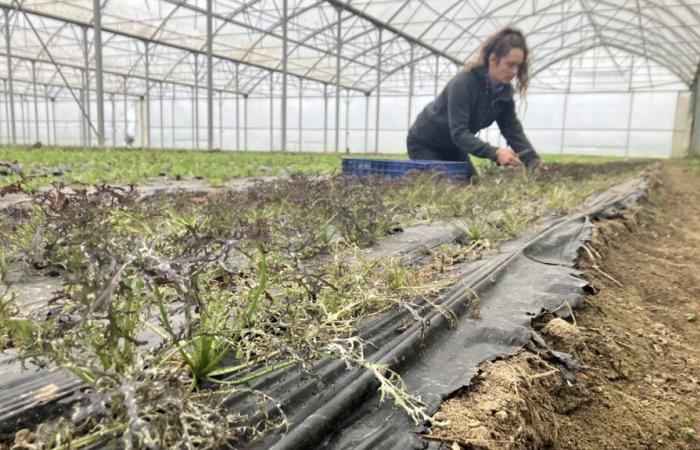
At the Jardins de Contrat de Montreuil-en-Touraine, a professional integration association around market gardening, the winter harvests were somewhat disrupted. At the feet of young shoots, chard and lamb's lettuce, small black mites with red legs wander around. No larger than a millimeter, but distinguishable with the naked eye, this mite called penthaleus major is harmful to crops.
« It pricks the leaf, which will create white spots. This depreciates the product, but above all its growth and development are slowed down »describes Anthony Sol, culture manager. « We raised much less than we hoped. Because of this mite, combined with other factors, we had a 10% loss on the young shoot. »he notes.
“It prefers cool and humid conditions”
In recent weeks, several infections of penthaleus major have been recorded in crops in the Centre-Val de Loire region. Clément Nivet, market gardener from Indre and regular at the Amboise market, was particularly affected this year. « I have 8,000 m² of greenhouses. They are all infested. I have a spinach greenhouse that has completely disappeared. In less than a week, the mites wiped out 600 m² »he testifies.
Touraine is currently more spared than its neighboring departments, with the only case of infection recorded in Montreuil-en-Touraine, according to the Chamber of Agriculture and Bio Center, a regional association which brings together players in the sector. agricultural.
« Those which are the most problematic in Indre-et-Loire are spider mites, which develop in dry and hot conditions, therefore in summer. But two species bother our crops in winter. These are the tyrophagus and the penthaleus major », shares Eva Carriço, market gardening advisor with Bio Centre.
« The penthaleus major has been gradually emerging in our region over the past four or five years »notes the specialist. « It prefers cool, humid conditions”she describes. Climatic conditions particularly relevant in recent months.
-« It is a very polyphagous pest. It affects all leaves and develops particularly in greenhouses »adds Édouard Meignen, market gardening advisor at Bio Center.
No approved treatment
Spinach, radishes, carrots, beets… The penthaleus major spreads with ease across multiple cultures and chapels. Once present, it is difficult to get rid of. « To date, there is no identified method to get rid of this mite. »co-authored by Eva Carriço.
« When a crop is affected, it is recommended to get rid of it and work the soil well to reduce the presence of eggs. »recommends the market gardening advisor. « It is also possible to use a thermal weeder to burn grass and mites on the surface, but that is not everything. »adds Édouard Meignen.
Advice that Anthony Sol followed in Montreuil-en-Touraine: “We made a crawl space. After cultivation, we used a gas thermal weeder to limit invasions, then we worked the soil to break the mite egg-laying cycle. », he relates. Enough to limit the spread of the mite in its culture, and even in the rest of the department.
Thomas Delaunay with Gaspard Mathé




